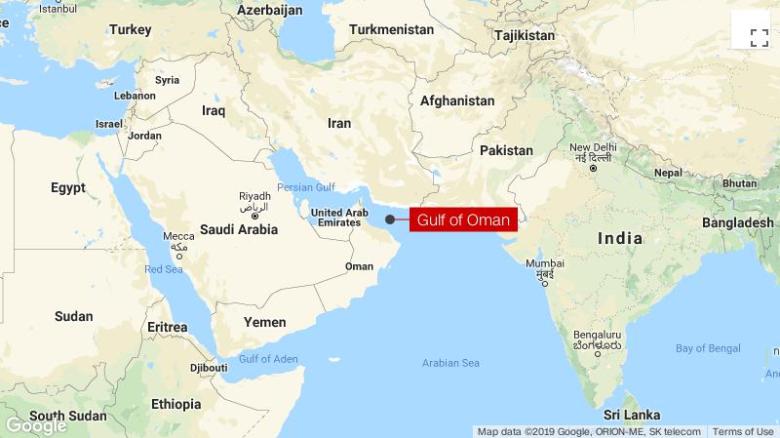
War risk
insurance has soared to around $185,000 for tankers passing through the
Strait of Hormuz area, according to a report from Bloomberg.
This was,due to increased tensions in the Gulf region, following the 13th June attacks on two tankers in the Gulf of Oman.
Following the earlier incidents in May at Fujairah, the war risk insurance had risen to $50,0000 per vessel.
A day after the two recent attacks, Royal Boskalis Westminster was appointed salvor for both vessels.
Shortly after the incidents, the insurers of both vessels appointed
Boskalis subsidiary SMIT Salvage to salvage the vessels and their cargo.
The salvage operations were undertaken in close consultation with the
relevant local authorities, including the Marine Emergency Mutual Aid
Centre (MEMAC).
Frontline said that the ‘Front Altair’s’ crew members had either
returned home or have re-embarked on the vessel to assist with recovery
operations and ship-to-ship transfer of cargo into another Frontline
operated vessel.
The company claimed it was able to deploy emergency responders in a
timely manner, who extinguished the fire on the vessel within hours of
the incident and ensured no pollution resulted.
‘Front Altair’ was in stable condition and anchored off Fujairah.
Following transfer of cargo, the LR2s damage will be further inspected
and the vessel will ultimately be moved to a shipyard for repair.
As previously reported, the possibility that the damage was caused by mechanical or human error has been ruled out completely.
Until further information is received regarding the cause of the
explosion and the security of this important shipping lane is secured,
Frontline will exercise extreme caution when considering new contracts
in the region and will consider all possible measures to insure the
safety of our crews and vessels operating in the area, the company
emphasised.
The other vessel involved in the alleged attacked, the ‘Kokuka
Courageous’ was also towed to Fujairah Anchorage. Her crew were reported
to be safe.
Meanwhile, VLCC spot freight rates between the Arabian Gulf and China
rose 101% in the days between 13th and 20th June 2019, in the aftermath
of the attacks, BIMCO’s Peter Sand said.
Spot freight rates for a VLCC reached $25,994 per day on 20th June, the
highest level since March and significantly above the May average of
$9,979 per day.
Despite this increase, rates on this route only narrowly exceeded the
daily breakeven costs of a VLCC, which on average amounts to $25,000 per
day.
Measured against global oil demand, around a fifth of global oil
consumption sails through the Strait of Hormuz, making the strait a
critical choke point for global energy markets, Sand said.
Taking into consideration seaborne transportation of crude oil, the
19.7 mill barrels per day transiting Hormuz represents 49% of the 40.5
mill barrels shipped in total - source: Clarksons Research.
Although spot freight rates for crude oil tankers ex Arabian Gulf have
risen sharply, rates for LR2s carrying clean oil products, such as
naphtha, remained much more stable. For example, spot freight rates for
an LR2 carrying 500,000 barrels of naphtha condensate from the Middle
East Gulf to Japan, rose by only 4% between the dates since the attack.
“The unchanged rates for oil product tankers compared with the jump in
freight rates for crude oil tankers, illustrate the differences between
the two market as well as the effects of sentiment on crude oil freight
rates,” Sand said. “The vast majority of tanker owners are more or less
going about with business as usual, although they have ratcheted up
their safety and security precautions when trading their ships in the
Arabian Gulf.”
These additional measures include speeding up while sailing through the
Strait of Hormuz, as well as avoiding sailing through it at night when
watchkeeping becomes more difficult.
The added costs of safety measures as well as higher insurance
premiums, which rose sharply following the news of the attacks, meant
that shipowners will not only face higher risks but also higher costs
when trading in the region.
“To avoid major disruption, it is vital for global energy trade that
the Strait of Hormuz remains accessible and safe for ships to sail
through. As long as tensions aren’t escalated the attacks are unlikely
to have a more profound effect. However, the risks that the conflict
will escalate remains very present and a great worry to everyone
involved with oil trading in the region,” Sand added.
BIMCO has urged all nations to do what they can to de-escalate the
situation and allow ships to pass safely through the Strait of Hormuz.
No comments:
Post a Comment